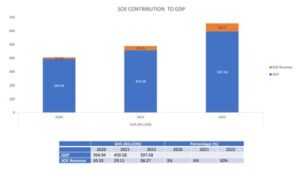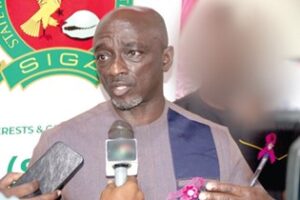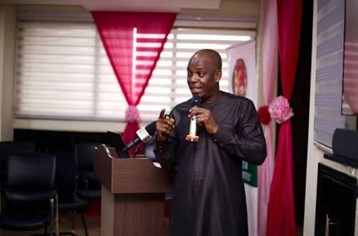State-owned enterprises (SOEs) contributed GHȼ58.2 billion – 10 percent – to Gross Domestic Product (GDP) in 2022, up from 3 percent in 2020.
In 2020 and 2021 they contributed 3 percent and 6 percent of GDP – GHȼ10.33-billion and GHȼ29.11billion respectively, Director-National Accounts, Controller and Accountant-General’s Department (CAGD), Dr. Mac-Effort Adadey has disclosed.
The total assets of SOEs as captured in the consolidated National Account also increased – from GH¢51.8billion in 2020 to GH¢419.2billion in 2022, with Dr. Adadey lauding the steady progress so far.

He spoke during the State Interests and Governance Authority (SIGA) second Editors’ Forum held in Accra, which spearheaded discussions on positioning state enterprises to become net contributors to the economy, and also strengthening communication between SIGA and the media.
The Director of National Accounts also disclosed that there is an ongoing effort to bring all government legacy fixed assets onto government’s balance sheet.
He noted that the move is a critical requirement in the public financial management landscape, and will allow for imbalances to be corrected.
“We have set out to bring all government legacy fixed assets back onto government’s balance sheet, because over the years we have been raising money – including debt contracting – to acquire these public assets; but because of the cash-accounting basis of preparing the national accounts, these assets are written-off and not reported on the balance sheet. The effect is that when you look at Ghana’s balance sheet, we have the public debt on it – but the assets which have been acquired with this public debt are not on the public sheet. So, you see a huge negative on the balance sheet,” he said.
The Director added that the balance sheet’s current picture does not show its true state, hence the exercise will get all public entities to use a standardised fixed asset register which takes account of assets being used – allowing the account directorate at CAGD to include them in the national account.
“By identifying and collecting data on government assets across public entities – by this I mean ministries, departments and agencies (MDAs) across the country – once we get these assets and have their values on the balance sheet, it will correct the imbalances by showing the true picture of Ghana’s value on the balance sheet.
“For the 2022 annual account, we have been able to bring several assets onto government’s balance sheet; and the expectation is that by end of 2023 we will do more, so the balance sheet will look better than it does now,” he added.
He explained that a good balance sheet will give the country a strong financial standing and allow it to relate to the external world.
“If you want to do business with other people, they will look at your balance sheet and be convinced that your net worth is okay. As a country, a good balance sheet also gives us the opportunity to relate with the external world, contract loans at a cheaper rate, and benefit from other good things a good balance sheet can offer any business or country,” he indicated.
He said in 2020, 19 SOEs onboarded the national account; and in 2021 it increased to 48 SOEs, subsequently reaching 62 in 2022.
“We are targetting 87 SOEs for 2023: the expectation is that in the 2023 annual account, we will have all of them responding and the picture will look better,” he added – encouraging all stakeholders, especially the state enterprises, to comply with the Public Finance Management Acts and Regulations to spur growth.

For his part, Director-General of SIGA, Edward Boateng, expressed his outfit’s and its partners’ readiness to help accelerate growth among the SOEs so they remain profitable and become a bedrock of the economy.
He urged the SOEs to leverage lessons learned from their recent study tour to China, facilitated by SIGA, which aimed at giving them first-hand access to their counterpart – China’s state-owned Assets Supervision and Administration Commission of the State Council (SASAC), which oversees 98 centrally controlled SOEs.
China is one of the few countries that have successfully developed its state enterprises to contribute significantly to its economy. Mr. Boateng expressed confidence that with the needed support and compliance, SOEs can significantly improve their fortunes.
China’s SASAC bestows a particular honour for operational excellence and high compliance with statutory rules and internal controls. Also, SOEs in China have a solid human resources workforce composition, with high turnaround rates, talent retention and good remuneration targets – as well as fierce competition among SASAC SOEs for good governance and high production targets. They are known for their complete emphasis on operational excellence and growth, with zero tolerance for bad performance.










